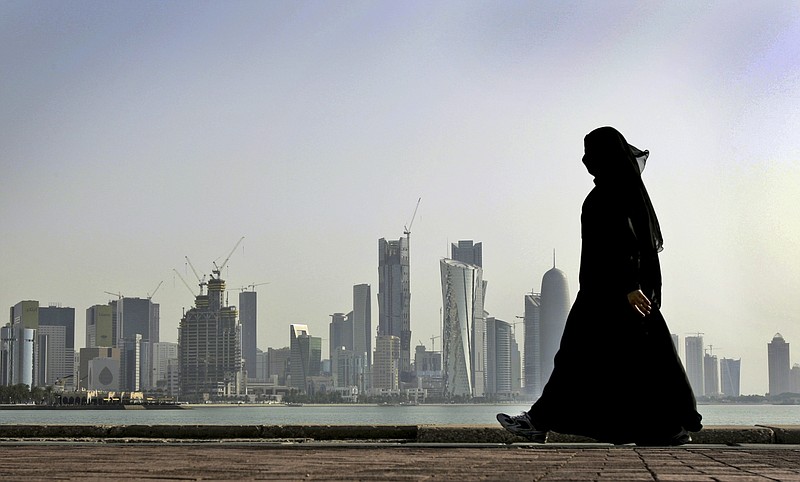DUBAI, United Arab Emirates (AP) - With just days to decide, Qatar on Friday weighed an onerous list of demands by its neighbors as a way out of a regional crisis, and a top Emirati official warned the tiny country to brace for a long-term economic squeeze unless it is willing to acquiesce.
Qatar did not immediately respond after receiving a clear set of demands for the first time, but the ultimatum was quickly rejected by its ally, Turkey, and blasted as an assault on free speech by Al-Jazeera, the Qatari broadcaster Saudi Arabia, the United Arab Emirates and others are demanding to be shut down.
Qatar's neighbors insisted the 13-point list of demands was their bottom line, not a starting point for negotiations. The Arab countries signaled if Qatar refuses to comply by the 10-day deadline, they will continue to restrict its access to land, sea and air routes indefinitely amid mounting economic pressure on the Persian Gulf nation.
"The measures that have been taken are there to stay until there is a long-term solution to the issue," Yousef al-Otaiba, ambassador to the U.S. from the United Arab Emirates, told the Associated Press.
Still, he suggested the penalties would only be economic and diplomatic, adding: "There is no military element to this whatsoever."
The demands from Qatar's neighbors amount to a call for a sweeping overhaul of Qatar's foreign policy and natural gas-funded influence peddling in the region. Complying would force Qatar to bring its policies in line with the regional vision of Saudi Arabia, the Middle East's biggest economy and gatekeeper of Qatar's only land border.
They include shutting news outlets, including Al-Jazeera and its affiliates; curbing diplomatic relations with Iran; and severing all ties with Islamist groups including the Muslim Brotherhood. The AP obtained a copy of the list in Arabic from one of the countries in the dispute.
Though Qatar is likely to reject the demands, the list answers the growing call from the United States and from Qatar for the countries to put their grievances in writing. It includes conditions that the gas-rich nation already has insisted it would never meet, including closing down Al-Jazeera.
Saudi Arabia, Egypt, the United Arab Emirates and Bahrain cut ties with Qatar over allegations it funds terrorism - an accusation Doha rejects but President Donald Trump has echoed. The move has left Qatar under a de facto blockade by its neighbors.
U.S. Secretary of State Rex Tillerson has tried to mediate and earlier this week called on the Arab nations to limit themselves to "reasonable and actionable" demands on Qatar. That call appeared to have been roundly ignored, and it was the Kuwaitis, who also offered to mediate, who delivered the list Thursday to Qatar.
"This is an Arab issue that requires an Arab solution," Otaiba said. "That's why the Kuwaitis will take the lead in the negotiation."
That's just fine, the U.S. said. At the White House, spokesman Sean Spicer called it a "family issue" for the Arab nations and declined to say whether the newly articulated demands were legitimate.
"This is something that they want to and should work out for themselves," Spicer said.
As the UAE and the others demanded Qatar terminate the Turkish military presence in the country, Turkish Defense Minister Fikri Isik said Friday the Turkish base aims to train Qatari soldiers and increase its security. According to the Milliyet newspaper, he also said "no one should be disturbed" by the Turkish presence in Qatar.
"At the moment, there is no likelihood of bringing the matter back to the table," he said.
Turkey has sided with Qatar in the dispute, and its parliament has ratified legislation allowing the deployment of Turkish troops to the base. The military said a contingent of 23 soldiers reached Doha on Thursday.
The head of Al-Jazeera's English language service said the network remained committed to continuing its broadcasts.
"Any call to close to down or curtail Al-Jazeera is nothing but an attempt to muzzle a voice of democracy in the region and suppress freedom of expression," he said by phone.
There's also a demand for Qatar to stop funding other news outlets, including Arabi21, Al-Araby Al-Jadeed and Middle East Eye.
Qatar has insisted its neighbors want it to bend to their will on a much broader set of issues; as the crisis has dragged on, the U.S. has started publicly questioning whether ulterior motives are involved.

